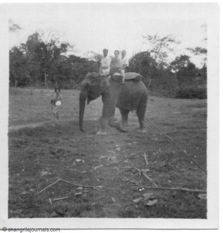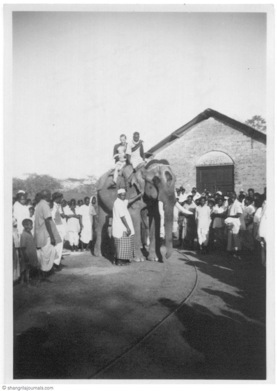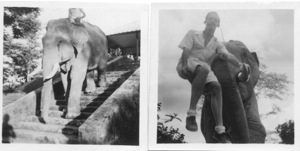
Talking With Elephants


Elephants, along with tractors and steam engines, were used for heavy hauling work in the Assam tea gardens. Photograph top right: Father Christopher and son Alick on an elephant at the Tilbhoom engine shed, February 1949. The elephant has been painted and decorated and the villagers are in their best dhotis so it must have been a puja or religious festival that day. Below right the elephant makes a house call on my father at the Tilbhoom bungalow. Bottom right: a Sunday outing with the Memsahib.

Talking With Elephants
Our bungalow at Tilbhoom was on a high hill. Our kitchen was a separate building slightly down the hill at the back. Below the kitchen, down a rather slippery, mossy and be-jungled track, there was on the flat a subjibari (vegetable garden) and a banana grove hedged by jungle undergrowth. One weekend, my father’s best friend John Cramphorn had come over from his distant tea estate Hatikira (Elephant Garden).
Late in the night the cooks reported that the bananas were being attacked and trampled by elephants. Father and Cramphorn, now thoroughly brave from an evening of drinking, took off down the hill to sort out the intruders.
The scene was quite something. Father and Cramphorn were waving sticks and telling a very large elephant to leave. Behind them on the track were wives, children, cooks and their families with torches and lanterns, all milling about and talking loudly. A vast entertainment. My mother telling father, “Christopher, come back immediately. What in heaven’s name do you think you are doing?”
The elephants stood their ground and continued wrecking the trees and then, of an accord, quietly turned and left.
During the 1942 Japanese invasion of Burma a teak forest ranger Lt. Colonel J.B. Williams’, “Elephant Bill”, assisted in the 14th Army retreat from Burma, at one stage using elephants from the teak forests to evacuate a number of British families to Assam ahead of the Japanese columns. At one stage Wild Bill had 700 elephants assisting British operations in Burma. After the war many of these elephants escaped or were set free.
It would appear that a group of these elephants, which were known to be in the jungles of the area, had decided to pay our banana grove a visit. And perhaps it also explains why two daft tea planters were able to harangue them with impunity and get away with it.